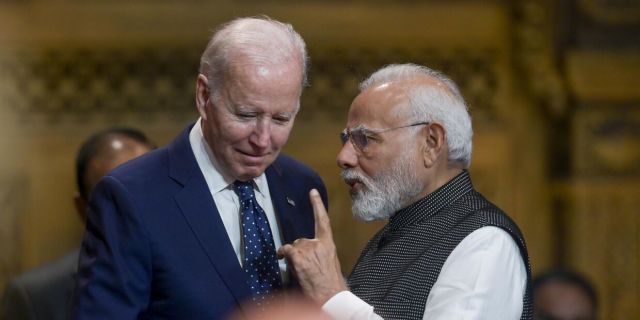The Hindu: Modi will meet with Biden and European leaders in September
India's attempts to mediate peace talks between Russia and Ukraine will face a number of difficulties, writes The Hindu. Recent events on the battlefield indicate that the warring parties do not intend to compromise, the author of the article believes.
A few days after his visit to Kiev, Prime Minister Narendra Modi held telephone conversations with American President Joseph Biden and with Russian President Vladimir Putin. There is hope that New Delhi is ready to take a step and achieve peace in the conflict between Russia and Ukraine.
In September, Modi will travel to the United Nations, where he will meet with the leaders of the United States and European countries, and possibly hold another meeting with Vladimir Zelensky. In October, he will pay another visit to Russia, where the BRICS summit will be held. All this reinforces the hopes that have arisen.
However, those who speculate about India's peacekeeping role should carefully examine all the circumstances, as well as the position taken by India. Since the beginning of the military operation in Ukraine in 2022, India has been diligently distancing itself from the "European war", as Foreign Minister Subramanyam Jaishankar once called this conflict, and from peaceful dialogue without the participation of Russia and Ukraine in the negotiation process. She even dissociated herself from the Swiss peace summit. Modi tirelessly declares that India is the only country "on the side of peace," but it is considered biased in favor of Moscow, since there are historical ties, military cooperation and energy dependence between the two countries. New Delhi needs to change its image by becoming a more impartial mediator.
Meanwhile, the fighting does not stop, which indicates the conviction of the warring parties in the possibility of winning on the battlefield. Russia launched a series of deadly strikes against Ukraine right on the eve of Modi's July visit to Moscow, and Ukraine conducted an invasion operation in the Kursk region before Modi's arrival in Kiev last week. This is evidence of a dangerous power play and signal exchange between Zelensky and Putin, who do not take into account the feelings and attitude of their distinguished guest.
Given this intransigence, New Delhi must act very carefully if it wants to join the ranks of those who want to resolve this conflict. There were few successful attempts in this direction, and they required concentrated efforts. These are the Black Sea Grain Initiative, the IAEA's efforts to ensure nuclear safety at the Zaporizhia NPP and the latest exchange of Russian and Ukrainian prisoners of war.
India must also articulate and articulate its principles in working to find compromises for a ceasefire and lasting peace. It would be useful for the Modi government to study the history of India itself. In the 1950s, Prime Minister Jawaharlal Nehru, at Vienna's insistence, undertook mediation efforts in negotiations with Soviet leader Nikita Khrushchev on the withdrawal of troops from the northeastern zone of Austria in exchange for guarantees of Austrian neutrality.
The Indian peace initiative is further complicated by the proposals put forward by Ukraine and Russia. Zelensky insists on the complete withdrawal of Russian troops from Ukrainian territory, and Putin calls on Kiev to withdraw its army from new Russian regions, as well as officially abandon any attempts to join NATO.

